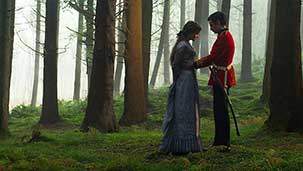In some ways your book Far From The Madding Crowd could stand as a proto-feminist manifesto. In other ways, important ways, it is an antecedent to some of the worst melodrama known to humanity. That the two things come together so artlessly in the 2015 film adaptation of your novel is unfortunate.
This iteration of Far From The Madding Crowd begins well. Your awkwardly named protagonist, Bathsheba Everdene, is fiercely independent and, thanks to a timely inheritance from a doting uncle, beholden to no one. For a woman to be propertied and untethered to any man was a rare circumstance at the end of the 19th Century.
Unfortunately, the rest of the story is a tangled web of contrivance involving three different Harlequin Romance archetypes. The quiet, self assured cowboy (in this case a shepherd played by Matthias Schoenaerts) the moneyed but damaged bachelor—Michael Sheen, of course—and even a faithless cad of a soldier, played by Tom Sturridge. As the story progresses it becomes hopelessly, and pointlessly, labyrinthine. A film that could have been a fascinating examination of class and gender in Victorian England devolves into a series of romantic mishaps.
The names of Bathsheba’s suitors betray a kind of on-the-noseness that is present throughout the narrative: Gabriel Oak as the Shepherd, William Boldwood (I’ll bet it is) as the aging bachelor and Sergeant Troy as the philandering gambler in soldier’s clothing. Even the date of the original publication doesn’t excuse this clumsy wordplay, since there are far too many novels that come from the same period—Jane Eyre and War and Peace just to name two—that rise far above this kind of genre laziness. I have also seen adaptations of Far From the Madding Crowd where the tone and the melodrama were circumvented in useful ways—Tamara Drewe most recently. But this particular version, helmed by director Tomas Vinterberg, is entirely too self-important and earnest to finesse the more leaden aspects of the plot.
All of the performances are uniformly competent, the film itself is beautifully shot and the source material is rich enough that it might have been used to create something far more interesting. But the film falls apart in the last two acts. By choosing to focus on the Bathsheba’s inept management of her personal relationships, Vinterberg undercuts the moments that could have elevated this beyond a high-end gothic romance.
There are glimpses of what would have been (at the time) seditious egalitarianism as Bathsheba mucks it up with her various employees, literally getting covered in shite—thereby confounding the Monty Python method of identifying the ruling classes. But these become throwaway moments as more and more of the film occupies itself with describing the ungainly four way relationship.
There is a way to make all of this work, I’m sure. But in this instance at least part of the problem is there is far too much story packed into too little time. Either this should have been a mini-series or there should have been some editorial decisions about what the film was going to focus on, because as it exists it is neither beast nor fowl—and that confusion is fatal.
Adaptations always carry a certain peril—lose the thread and you will be crucified by the fans. Or stick too closely and you run the risk of being hamstrung by the limitations of the original text. In this case a more liberal interpretation of your source material may well have served everyone better. As it stands Far From The Madding Crowd is a film that is weighed down by a story that once must have felt revolutionary, but now seems trite.
Sincerely,

Tim







